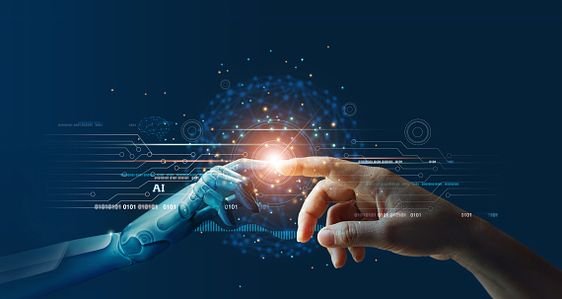
Artificial Intelligence (AI) has revolutionized various industries, and healthcare is no exception. AI’s potential to enhance medical practices, improve patient outcomes, and streamline operations is immense. This article delves into the role of AI in modern healthcare, its applications, benefits, challenges, and future prospects.
The Role of AI in Healthcare
Enhancing Diagnostics
AI has significantly improved the accuracy and efficiency of medical diagnostics. Advanced algorithms and machine learning models analyze vast amounts of data, including medical images, genetic information, and patient records, to identify patterns and make accurate diagnoses. For instance, AI-powered imaging systems can detect anomalies in X-rays, MRIs, and CT scans with remarkable precision, often surpassing human capabilities.
Personalized Medicine
AI enables personalized medicine by analyzing individual patient data to tailor treatments. Machine learning models consider genetic information, lifestyle, and environmental factors to predict how patients will respond to different treatments. This personalized approach increases the effectiveness of therapies and reduces the risk of adverse effects.
Predictive Analytics
Predictive analytics powered by AI helps healthcare providers anticipate and prevent potential health issues. By analyzing historical data and identifying trends, AI can predict outbreaks of diseases, hospital readmission rates, and patient deterioration. This proactive approach allows for timely interventions and better resource allocation.
Streamlining Administrative Tasks
AI automates administrative tasks, such as scheduling, billing, and patient registration, reducing the workload on healthcare staff and minimizing errors. Natural language processing (NLP) algorithms can transcribe medical notes and extract relevant information from electronic health records (EHRs), streamlining documentation and improving data accuracy.
Applications of AI in Healthcare
Medical Imaging
Medical imaging is one of the most prominent applications of AI in healthcare. AI algorithms analyze medical images to detect abnormalities, such as tumors, fractures, and infections. These algorithms learn from vast datasets, continuously improving their accuracy. For example, Google’s DeepMind has developed an AI system that can diagnose eye diseases by analyzing retinal scans, achieving an accuracy comparable to human specialists.
Drug Discovery
AI accelerates drug discovery by analyzing biological data and predicting the efficacy of potential compounds. Traditional drug discovery processes are time-consuming and expensive, but AI models can screen vast libraries of compounds in a fraction of the time. This not only speeds up the development of new drugs but also reduces costs. Companies like BenevolentAI and Atomwise are leveraging AI to revolutionize drug discovery and development.
Virtual Health Assistants
Virtual health assistants powered by AI provide patients with personalized health information and support. These assistants use NLP to understand and respond to patient queries, offering advice on medication, lifestyle changes, and symptom management. Virtual health assistants like Ada and Woebot are increasingly popular, providing accessible and affordable healthcare support.
Remote Monitoring and Telemedicine
AI enables remote monitoring and telemedicine, allowing healthcare providers to monitor patients’ health conditions in real-time. Wearable devices and IoT sensors collect data on vital signs, physical activity, and sleep patterns. AI algorithms analyze this data to detect anomalies and alert healthcare providers to potential issues. Telemedicine platforms use AI to triage patients, prioritize care, and provide virtual consultations, improving access to healthcare services.
Robotic Surgery
Robotic surgery systems, such as the da Vinci Surgical System, use AI to assist surgeons in performing complex procedures with precision. These systems provide enhanced visualization, dexterity, and control, reducing the risk of complications and improving patient outcomes. AI algorithms analyze data from previous surgeries to optimize surgical techniques and outcomes.
Benefits of AI in Healthcare
Improved Accuracy and Efficiency
AI enhances the accuracy and efficiency of medical diagnostics and treatments. Machine learning models analyze vast amounts of data quickly and accurately, identifying patterns and making predictions that might be missed by human practitioners. This leads to earlier detection of diseases, more accurate diagnoses, and personalized treatment plans.
Cost Reduction
AI reduces healthcare costs by streamlining administrative tasks, optimizing resource allocation, and accelerating drug discovery. Automated systems handle repetitive tasks, freeing up healthcare staff to focus on patient care. Predictive analytics helps prevent costly hospital readmissions and unnecessary treatments, ultimately reducing overall healthcare expenditures.
Enhanced Patient Care
AI improves patient care by providing personalized treatment plans and continuous monitoring. Predictive analytics identify high-risk patients, enabling timely interventions and reducing the risk of complications. Virtual health assistants offer patients immediate access to health information and support, improving patient engagement and satisfaction.
Better Resource Allocation
AI optimizes resource allocation by predicting patient demand, identifying inefficiencies, and automating administrative tasks. Hospitals and clinics can better manage their staff, equipment, and facilities, ensuring that resources are available when and where they are needed most. This leads to improved patient outcomes and a more efficient healthcare system.
Accelerated Research and Development
AI accelerates medical research and development by analyzing vast datasets and identifying potential breakthroughs. Machine learning models can predict the efficacy of new drugs, design clinical trials, and analyze genomic data to identify disease markers. This speeds up the development of new treatments and therapies, bringing them to market faster.
Challenges of AI in Healthcare
Data Privacy and Security
The use of AI in healthcare raises significant data privacy and security concerns. Patient data is highly sensitive, and any breach can have severe consequences. Ensuring the security and confidentiality of patient information is paramount. Healthcare providers must implement robust cybersecurity measures and comply with regulations such as the Health Insurance Portability and Accountability Act (HIPAA) to protect patient data.
Ethical Considerations
AI in healthcare presents ethical challenges, particularly concerning the transparency and accountability of AI algorithms. Healthcare providers must ensure that AI systems are unbiased and do not perpetuate existing disparities in healthcare. There is also the question of accountability in cases where AI systems make errors or fail to provide accurate diagnoses.
Integration with Existing Systems
Integrating AI systems with existing healthcare infrastructure can be challenging. Many healthcare providers still rely on legacy systems that are not compatible with modern AI technologies. Upgrading these systems requires significant investment and can disrupt healthcare operations. Additionally, healthcare providers need to train staff to use new AI tools effectively.
Regulatory Hurdles
The regulatory landscape for AI in healthcare is still evolving. Ensuring compliance with existing regulations and obtaining approval for new AI-based medical devices and treatments can be time-consuming and complex. Regulatory bodies must develop clear guidelines for the use of AI in healthcare to facilitate innovation while ensuring patient safety.
Technical Limitations
AI algorithms require large amounts of high-quality data to function effectively. In many cases, healthcare data is fragmented, incomplete, or inconsistent, making it difficult to train AI models accurately. Additionally, AI systems can be susceptible to biases in the data, leading to inaccurate predictions and diagnoses.
Future Prospects of AI in Healthcare
Integration of AI with Blockchain
Combining AI with blockchain technology has the potential to enhance data security and interoperability in healthcare. Blockchain can provide a secure and transparent way to store and share patient data, ensuring that AI algorithms have access to accurate and complete information. This integration can also improve patient consent management and data traceability.
AI-Driven Genomics
AI has the potential to revolutionize genomics by analyzing vast amounts of genetic data to identify disease markers and develop personalized treatments. AI algorithms can predict the risk of genetic disorders, recommend targeted therapies, and accelerate the development of gene-editing technologies. Companies like Deep Genomics and Helix are at the forefront of AI-driven genomics research.
AI in Mental Health
AI-powered tools are being developed to support mental health care by analyzing speech, text, and behavioral data to detect signs of mental health issues. Virtual health assistants and chatbots can provide immediate support to individuals experiencing mental health challenges. AI can also personalize treatment plans and monitor patient progress in real-time.
AI in Global Health
AI has the potential to address global health challenges by providing scalable and cost-effective solutions. AI-powered diagnostic tools can improve access to healthcare in remote and underserved areas. Predictive analytics can help track and control the spread of infectious diseases. Additionally, AI can support telemedicine initiatives, connecting patients with healthcare providers worldwide.
Continuous Learning and Improvement
AI systems in healthcare are continuously learning and improving as they process more data and refine their algorithms. This ongoing learning process ensures that AI systems stay up-to-date with the latest medical knowledge and advancements. Future AI systems will be even more accurate, efficient, and capable of providing personalized care.
AI has the potential to transform modern healthcare by improving diagnostics, personalizing treatments, enhancing patient care, and reducing costs. Its applications in medical imaging, drug discovery, virtual health assistants, remote monitoring, and robotic surgery are already making a significant impact. However, challenges related to data privacy, ethics, integration, regulation, and technical limitations must be addressed to fully realize AI’s potential in healthcare.
As AI technology continues to evolve, its role in healthcare will become even more prominent. Future advancements, such as the integration of AI with blockchain, AI-driven genomics, and AI in mental health and global health, will further revolutionize the industry. By harnessing the power of AI, healthcare providers can deliver better patient outcomes, improve operational efficiency, and advance medical research, ultimately leading to a healthier and more equitable world.
ALSO READ: OpenAI Partners with Los Alamos National Laboratory









